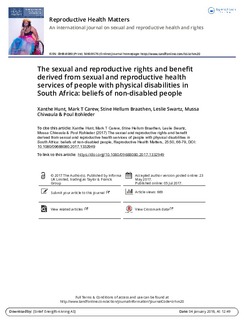| dc.contributor.author | Hunt, Xanthe | |
| dc.contributor.author | Carew, Mark | |
| dc.contributor.author | Braathen, Stine Hellum | |
| dc.contributor.author | Swartz, Leslie | |
| dc.contributor.author | Chiwaula, Mussa | |
| dc.contributor.author | Rohleder, Poul | |
| dc.date.accessioned | 2019-02-27T13:57:45Z | |
| dc.date.available | 2019-02-27T13:57:45Z | |
| dc.date.created | 2017-06-29T17:15:35Z | |
| dc.date.issued | 2017 | |
| dc.identifier.citation | Reproductive health matters. 2017, 25 (50), 66-79. | nb_NO |
| dc.identifier.issn | 0968-8080 | |
| dc.identifier.uri | http://hdl.handle.net/11250/2587859 | |
| dc.description.abstract | There is a body of theoretical work, and some empirical research, which suggests that non-disabled people assume people with physical disabilities are not suitable romantic partners, do not have sexual drives or desires, or are not sexually active. It has also been proposed that people with physical disabilities face barriers to sexual healthcare access which are structural as well as social. The present paper explores non-disabled South Africans' beliefs concerning the degree to which non-disabled respondents enjoy sexual and reproductive rights, and benefit from sexual and reproductive healthcare, compared to people without disability. Using a survey, we asked 1989 South Africans to estimate the degree to which people with physical disabilities and people without disability have sexual rights, and benefit from sexual and reproductive healthcare services, respectively. Respondents were more likely to support the idea that the population without disability were deserving of sexual rights compared to people with physical disabilities. Respondents were more likely to rate the degree to which people with physical disability benefit from sexual and reproductive healthcare as less than that for people without physical disabilities. These findings provide some of the first empirical support that non-disabled people perceive people with physical disabilities as having fewer sexual and reproductive rights, and deriving less benefit from sexual and reproductive health services, than the population without disability. To have diminished sexual rights, and benefit less from sexual and reproductive healthcare, we suggest, evinces a negation of the sexual and reproductive needs and capacity of people with physical disabilities. | nb_NO |
| dc.language.iso | eng | nb_NO |
| dc.rights | Navngivelse 4.0 Internasjonal | * |
| dc.rights.uri | http://creativecommons.org/licenses/by/4.0/deed.no | * |
| dc.title | The sexual and reproductive rights and benefit derived from sexual and reproductive health services of people with physical disabilities in South Africa: beliefs of non-disabled people | nb_NO |
| dc.type | Journal article | nb_NO |
| dc.type | Peer reviewed | nb_NO |
| dc.description.version | publishedVersion | nb_NO |
| dc.source.pagenumber | 66-79 | nb_NO |
| dc.source.volume | 25 | nb_NO |
| dc.source.journal | Reproductive health matters | nb_NO |
| dc.source.issue | 50 | nb_NO |
| dc.identifier.doi | 10.1080/09688080.2017.1332949 | |
| dc.identifier.cristin | 1479978 | |
| cristin.unitcode | 7401,60,25,0 | |
| cristin.unitname | Helse | |
| cristin.ispublished | true | |
| cristin.fulltext | original | |
| cristin.qualitycode | 1 | |

